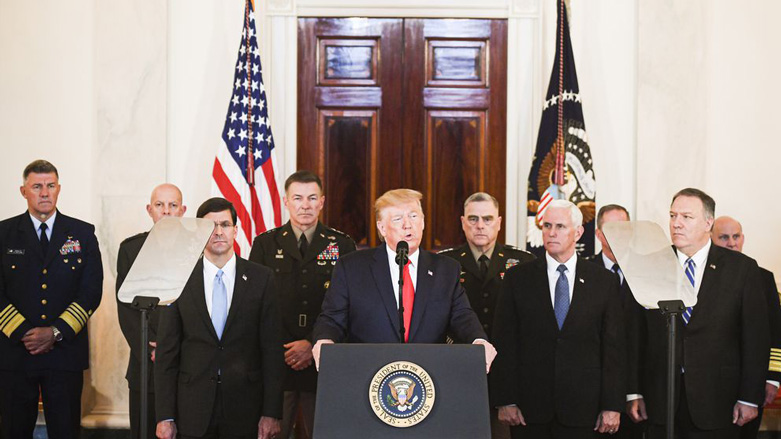Trump deescalates after Iranian missile attacks

WASHINGTON DC (Kurdistan 24) – US President Donald Trump explained on Wednesday that the Iranian missile attacks that targeted two bases that host US troops had done limited damage, and he would respond accordingly—not with a military strike, but with yet more economic sanctions.
Read More: Iran strikes military bases in Iraq, Kurdistan housing US forces: Pentagon
Ain al-Assad air base, in Western Iraq, was the target of ten Iranian ballistic missiles, apparently launched from Iranian territory, while a base in the Kurdistan Region was the target of two missiles, both of which landed harmlessly, wide of their aim.
“Iran appears to be standing down,” Trump proclaimed, as he began his speech, describing that as “a good thing for all parties concerned and a very good thing for the world.”
“No American or Iraqi lives were lost,” Trump continued, “because of the precautions taken, the dispersal of forces, and an early warning system that worked very well.”
Trump proceeded to denounce both Qasim Soleimani, who headed Iran’s Quds Force, until his assassination late on Thursday, by an armed US drone, as well as the Iranian regime itself.
NATO, Sanctions, and the JCPOA
Trump announced three new steps that he wanted other countries to undertake or that the US, itself, would implement. However, all three were short on specifics.
“Today, I am going to ask NATO to become much more involved in the Middle East process,” he said, without providing any details about precisely what he wanted NATO to do.
NATO has been training Iraqi security forces. However, it announced on Saturday, following Soleimani’s assassination, that it was temporarily suspending that training.
Read More: NATO suspends training in Iraq following Qasim Soleimani killing: spokesperson
Presumably, if this really is the start of a deescalation of tensions, the NATO training will resume.
Trump also announced that the US “will immediately impose additional punishing sanctions on the Iranian regime,” again, without providing details. His administration has already imposed very extensive sanctions on Iran, and it is not obvious what further measures would be meaningful.
In addition, Trump called on the other signatories to the 2015 Iranian nuclear deal—Britain, China, France, and Russia—to follow the US lead and “break away” from its “remnants.”
Trump wants to reach a new understanding with Iran that would address not only its nuclear program, but other aspects of its destabilizing behavior, including Iran’s ballistic missile program and its support for terrorism.
Indeed, Trump concluded his address with words directed toward the Iranian people and leaders: “We want you to have a future and a great future—one that you deserve—one of prosperity at home and harmony with the nations of the world.”
Tehran offered no indication that it was prepared to consider negotiations with the US. However, the decrease in tensions, signaled by Trump’s speech, was almost certainly welcomed in the Kurdistan Region and, more broadly, in Iraq as a whole.
Read More: Kurdistan Region leaders discuss Iran missile attack, reiterate need for de-escalation
A statement issued earlier on Wednesday by Kurdish leaders affirmed that “the Kurdistan Region supports de-escalation of the situation and seeks dialogue and diplomatic solutions to the problems.”
The KRG “seeks stability and peace and urges all parties to refrain from dragging the Kurdistan Region into the rivalries,” they said.
Editing by John J. Catherine
